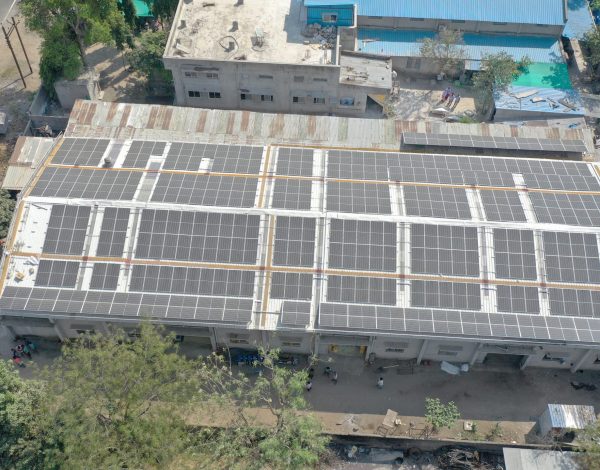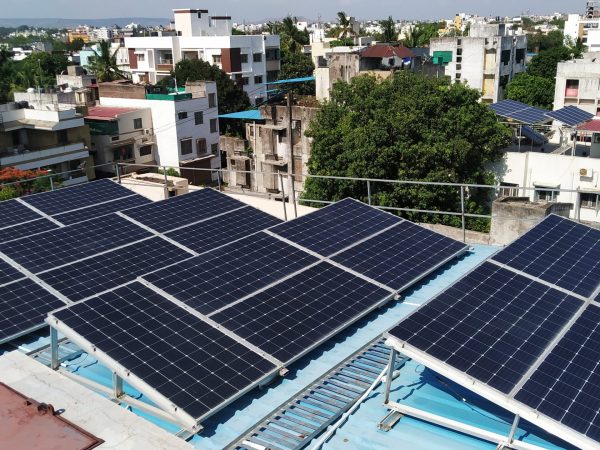Have questions about Solar for your Business?
Schedule a Solar discovery call and Design Consultation with InfiSol Energy
See how much you’ll save with solar
To get a complete understanding of your solar needs,
please fill out the form. Infisol Energy will contact you
with solar education.
Schedule a discovery call with a solar expert
From Infisol Energy
Frequently Asked Questions
General
+ What is a Solar PV System and how does it work?
PV, short for Photovoltaic, derives its name from the process of converting light (‘photo’) directly into electricity (‘voltaic’). Simply put, a Solar PV system is a power station that generates electricity from sunlight.
The main components of a Solar PV system are:
Solar Panels or Modules: Solar panels consist of a group of small cells made from semiconductor material. When the sun’s light falls on the modules, it excites the electrons, thereby creating direct current (DC).
Solar Inverter: The DC electricity goes into an inverter that converts it into alternating current (AC). We use AC for running our household or office or factory equipment.
Storage Battery (optional): The best use of solar energy is to consume it while it is being generated. If the requirement is to store this power and consume it in the non-sunny hours, then solar energy can be stored in batteries for later consumption.
+ Does a Solar PV system produce same energy output throughout the day?
Since Solar PV works on the basis of the intensity of sunlight it gets, your solar system typically wakes up at around 6am in the morning and goes to sleep at about 6 or 7pm in the evening. The energy output increases gradually and peaks at around noon and then gradually decreases as the Sun starts setting. But since the solar energy produced integrates either with your existing electrical connection or with your batteries, the running of your electrical equipment is not impacted. Moreover, if your Solar PV system is designed well, all your electrical equipment is totally safe.
+ What factors are important to consider when planning to go solar?
When planning to go solar, it is important to consider:
How much of your energy needs can you meet with solar?
How much can you save by going solar?
Do you have enough shadow-free space (land or roof)?
How much do you want to invest in your solar PV system?
Every Solar PV system is customized based on your site conditions. Therefore, you need a fair assessment of your energy requirements, site conditions and the solar energy generation potential at your site which would directly impact your savings.
+ Can solar be my sole energy source?
Technically speaking, yes, if batteries are used. But practically, if grid power is available, then it is recommended to use solar in combination with grid. Solar PV can be integrated with your existing power sources (like grid power, inverter, diesel generator, etc.) in such a manner that the first priority is automatically always given to the solar power to be consumed first. However, if you are using Solar PV for night time usage or in a remote location, it is quite common to have Solar systems which are battery-backed.
+ What is the life and reliability of a Solar PV System?
Solar PV is a highly proven and reliable technology and have been in use since 1950s. A PV system that is designed, installed, and maintained well will operate for 25 years or even more than 25 years. The Inverters, which are an integral part of a Solar PV system, may need a replacement once in the 25 years lifetime of the system. Moreover, since there are no moving parts (unless you are using tracking devices to move modules tilt with the movement of the Sun), there is practically negligible wear and tear.

Schedule a discovery call with a solar expert
from infisol energy

Solar Maintenance
+ How much time does it take to install a solar PV system?
It takes about 2-4 weeks to install a smaller system and about 4-8 weeks for larger systems. However, the actual construction time at the site is much lower since almost half of the time is spent on off-site activities such as design, engineering, procurement, etc. In certain cases, there may be variations to these timelines on account of access to the site, rains, etc.
+ What factors are important to consider during Solar PV system installation?
Good solar installers follow standard procedures and quality standards. So once you’ve chosen the right installer, you don’t have to worry about supervision.
However, it may be a good practice to:
Ask for layout drawing and bill of material.
Ensure that the delivered material is as per the bill of material, is damaged free and is kept at a safe place.
Ensure that cables and wires are properly tied and clamped.
+ What would be the annual maintenance cost for a solar PV system?
The annual maintenance and recurring costs are almost negligible since there are no moving parts and the input fuel (sunlight) is free. For optimum performance, the system only requires cleaning of modules and basic preventive and corrective maintenance. However, for off-grid systems where batteries are used, the maintenance costs are higher on account of battery replacement every 3-5 years. To ensure high generation and low maintenance cost, regular monitoring through data loggers is highly recommended. Typically, the maintenance costs for smaller Solar PV systems is about 2% of the initial system cost, and for larger systems is about 1% of the initial cost.
+ What permits & approvals do I need to install a solar PV system?
No permits would be needed, if you are going to install off grid Solar PV system or grid-connected system for captive (self) consumption. For net metering and gross metering system, certain permits and approvals are required.
For Net & Gross Metering:
1. Approval from DISCOM for grid connectivity.
2. CEIG(Chief electrical inspector to the government of state) approval for the capacity more than 10 KW(This capacity may vary from state to state).
SCHEDULE A DISCOVERY CALL
